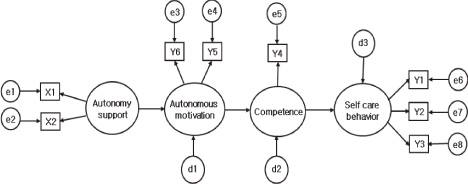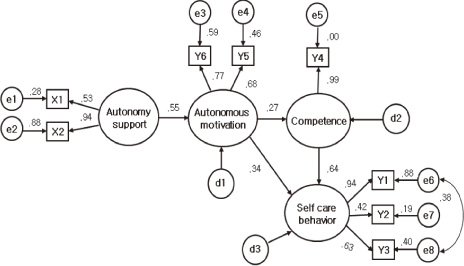Articles
- Page Path
- HOME > J Korean Acad Nurs > Volume 41(4); 2011 > Article
-
Original Article
- A Predictive Model on Self Care Behavior for Patients with Type 2 Diabetes: Based on Self-Determination Theory
- Yeong Mi Seo, Won Hee Choi
-
Journal of Korean Academy of Nursing 2011;41(4):491-499.
DOI: https://doi.org/10.4040/jkan.2011.41.4.491
Published online: August 31, 2011
1Full-time Lecturer, Department of Nursing, Dongseo University, Busan, Korea.
2Assistant Professor, Department of Nursing, Koje College, Geoje, Korea.
- Address reprint requests to: Choi, Won Hee. Department of Nursing, Koje College, 654-1 Jangseungpo-dong, Geoje 656-701, Korea. Tel: +82-55-680-1570, Fax: +82-55-680-1517, daeam67@hanmail.net
© 2011 Korean Society of Nursing Science
Abstract
-
Purpose
- The study was conducted to develop and test a hypothetical model which explains self-care behavior in patients with type 2 diabetes was established based on the Self-Determination Theory.
-
Methods
- The participants were 218 patients with type 2 diabetes mellitus enrolled in an outpatient clinic of one endocrine center in Korea. The data were collected using questionnaires from April 5 through May 7, 2010. The descriptive and correlation statistics were analyzed using the SPSS/WIN 15.0 and the structural equation modeling procedure was performed using the AMOS 7.0 program.
-
Results
- The results of this study showed that competence and autonomous motivation were the strong factors influencing self-care behavior in patients in this sample. Support from health provider for autonomy was a significant indirect factor on self-care behavior. These factors explained 64.9% of variance in the participants' self care behavior. The proposed model was concise and extensive in predicting self-care behavior of the participants.
-
Conclusion
- Findings may provide useful assistance in developing effective nursing interventions for maintaining and promoting self-care behavior in patients with type 2 diabetes.
- 1. Bandura A. Human agency in social cognitive theory. American Psychologist. 1989;44:1175–1184. doi: 10.1037/0003-066x.44.9.1175.ArticlePubMed
- 2. Becker MH. Becker MH. The health belief model and sick role behavior. In: The health belief model and personal health behavior. 1974;New Jersey, Charles B. Slack. 82–92.
- 3. Choi EJ. Factors related to glycemic control in patients with type 2 diabetics mellitus. 2007;Seoul, Yonsei University. Unpublished doctoral dissertation.
- 4. Choi EO. Effects of empowerment education program for the type 2 diabetics on the empowerment, self-care behavior and the glycemic control. 1998;Seoul, Seoul National University. Unpublished doctoral dissertation.
- 5. Chou CP, Bentler PM. Hoyle RH. Estimates and tests in structural equation modeling. In: Structural equation modeling. 1995;Thousand Oaks, CA, Sage. 37–59.
- 6. Deci EL, Ryan RM. Intrinsic motivation and self-determination in human behavior. 1985;New York, Plenum.
- 7. Deci EL, Ryan RM. The "what" and "why" of goal pursuits: Human needs and the self-determination of behavior. Psychological Inquiry. 2000;11:227–268.Article
- 8. Fortier MS, Sweet SN, O'Sullivan TL, Williams GC. A self-determination process model of physical activity adoption in the context of a randomized controlled trial. Psychology of Sport and Exercise. 2007;8:741–757. doi: 10.1016/j.psychsport.2006.10.006.Article
- 9. Gu MO. A structural model for self-care behavior and metabolic control in diabetic patient. 1992;Seoul, Seoul National University. Unpublished doctoral dissertation.
- 10. Hazavehei SM, Sharifirad G, Mohabi S. The effect of educational program based on health belief model on diabetic foot care. International Journal of Diabetes in Developing Countries. 2007;27:18–23.Article
- 11. Kennedy S, Goggin K, Nollen N. Adherence to HIV medications: Utility of the theory of self-determination. Cognitive Therapy and Research. 2004;28:611–628. doi: 10.1023/B:COTR.0000045568.95219.e2.Article
- 12. Kim KS. Structural equation model: AMOS 7.0. 2007;Seoul, Hannarae.
- 13. Ko CH, Gu MO. The effects of a diabetic educational program for coping with problem situation on self-efficacy, self care behaviors, coping and glycemic control in type 2 diabetic patients. Journal of Korean Academy of Nursing. 2004;34:1205–1214.ArticlePubMedPDF
- 14. Korea Centers for Disease Control and Prevention. 2007 Korea national health statistics: The fourth Korea national health and nutrition examination survey (Issue Brief No. 11702). 2008;12;Seoul, Author.
- 15. Lee YS. The current status of type 2 diabetes management at a university hospital. Korean Diabetes Journal. 2009;33:241–250. doi: 10.4093/kdj.2009.33.3.241.
- 16. Lim KB, Lee R, Ko KN, Choi EY, Kim JH, Cheong YS, et al. Self-care for diabetic patients in primary care. Journal of the Korean Academy of Family Medicine. 2007;28:106–113.
- 17. Markland D, Ryan RM, Tobin VJ, Rollnick S. Motivational interviewing and self-determination theory. Journal of Social and Clinical Psychology. 2005;24:811–831. doi: 10.1521/jscp.2005.24.6.811.Article
- 18. Münster Halvari AE, Halvari H. Motivational predictors of change in oral health: An experimental test of self-determination theory. Motivation and Emotion. 2006;30:294–305. doi: 10.1007/s11031-006-9035-8.ArticlePDF
- 19. Park JH, Kim KW, Kang EJ, Kim TY, Lee SR, Bae SC, et al. Evaluation of glycemic control in type 2 diabetic patients have been treated in general hospital. The Journal of Korean Diabetes Association. 2004;28:208–218.
- 20. Pender NJ. Health promotion in nursing practice. 1996;3rd ed. Stanford, CT, Appleton & Lange.
- 21. Peyrot M. Behavioral change in diabetes education. Diabetes Educator. 1999;25(6):62–73. doi: 10.1177/014572179902500624.PubMed
- 22. Ryan RM, Patrick H, Deci EL, Williams GC. Facilitating health behavior change and its maintenance: Interventions based on self-determination theory. The European Health Psychologist. 2008;10(1):2–5.
- 23. Senecal C, Nouwen A, White D. Motivation and dietary self-care in adults with diabetes: are self-efficacy and autonomous self-regulation complementary or competing constructs? Health Psychology. 2000;19:452–457. doi: 10.1037/0278-6133.19.5.452.ArticlePubMed
- 24. Seo YM. A structural model development for health behavior adherence in hypertensive or diabetic patients. 2008;Daegu, Kyungpook National University. Unpublished doctoral dissertation.
- 25. Sheldon KM, Williams GC, Joiner T. Self-determination theory in the clinic: Motivating physical and mental health. 2003;New Haven, CT, Yale University Press.
- 26. Prospective U, Holman RR. UK Prospective Diabetes Study(UKPDS) Group. Intensive blood-glucose control with sulphonylureas or insulin compared with conventional treatment and risk of complications in patients with type 2 diabetes (UKPDS 33). Lancet. 1998;352:837–853. doi: 10.1016/S0140-636(98)07019-6.ArticlePubMed
- 27. Williams GC, Freedman ZR, Deci EL. Supporting autonomy to motivate patients with diabetes for glucose control. Diabetes Care. 1998;21:1644–1651. doi: 10.2337/diacare.21.10.1644.ArticlePubMedPDF
- 28. Williams GC, Grow VM, Freedman ZR, Ryan RM, Deci EL. Motivational predictors of weight loss and weight-loss maintenance. Journal of Personality and Social Psychology. 1996;70:115–126. doi: 10.1037/0022-3514.70.1.115.ArticlePubMed
- 29. Williams GC, McGregor HA, Zeldman A, Freedman ZR, Deci EL. Testing a self-determination theory process model for promoting glycemic control through diabetes self-management. Health Psychology. 2004;23:58–66. doi: 10.1037/0278-6133.23.1.58.ArticlePubMed
- 30. Williams GC, Patrick H, Niemiec CP, Williams LK, Devine G, Lafata JE, et al. Reducing the health risks of diabetes: How self-determination theory may help improve medication adherence and quality of life. Diabetes Educator. 2009;35:484–492. doi: 10.1177/0145721709333856.PubMed
REFERENCES


Figure & Data
REFERENCES
Citations

- Factors Affecting Physical Activity Adherence in Male Office Workers Based on Self-Determination Theory: The Mediating Effects of Psychological Need Satisfaction and Autonomous Motivation
Sangmi Han, Yeongmi Ha
Healthcare.2025; 13(15): 1852. CrossRef - Mediating Effect of Autonomy Support between Exercise Knowledge and Exercise Self-Efficacy of Patients with Severe Mental Illness
Jein Park, Young-Ran Kweon
Journal of Korean Academy of psychiatric and Mental Health Nursing.2024; 33(2): 104. CrossRef - Development and Evaluation of Motivational Interviewing Pulmonary Rehabilitation Program Based on Self-Determination Theory for Patients with Chronic Obstructive Pulmonary Disease
Jun Hee Jang, Hye Sook Min
Journal of Korean Academy of Nursing.2023; 53(2): 191. CrossRef - Autonomy is not but competence and relatedness are associated with physical activity among colorectal cancer survivors
Kyoung-A Kim, Sang Hui Chu, Eui Geum Oh, Sang Joon Shin, Justin Y. Jeon, Yun Jin Lee
Supportive Care in Cancer.2021; 29(3): 1653. CrossRef - Feasibility and preliminary effects of a theory-based self-management program for kidney transplant recipients: A pilot study
Hye Won Jeong, Chi Eun Song, Minjeong An, Lucy E. Selman
PLOS ONE.2021; 16(6): e0248947. CrossRef - Development and Effect of a Smartphone Overdependence Prevention Program for University Students Based on Self-Determination Theory
Myung Soon Kwon, Jeong Soon Yu
Journal of Korean Academy of Nursing.2020; 50(1): 116. CrossRef - Exploring the Basic Psychological Needs Necessary for the Internalized Motivation of University Students with Smartphone Overdependence: Applying a Self-Determination Theory
Myung Soon Kwon, Juhye Jin
Journal of Korean Academy of Psychiatric and Mental Health Nursing.2019; 28(1): 26. CrossRef - Factors Influencing Self-Care Behaviors of Renal Dialysis Patients
Yoonjung Kim, Sanggeon Park
STRESS.2019; 27(4): 320. CrossRef - Association of Basic Psychological Needs with Recovery Attitude in Inpatients with Alcohol Use Disorders based on the Self-Determination Theory
Jae Woon Lee, Kinoh Kang
Journal of Korean Academy of Psychiatric and Mental Health Nursing.2019; 28(4): 344. CrossRef - Mediation Effects of Basic Psychological Needs Between Autonomy Support from Healthcare Providers and Self-Management Among Cancer Survivors
Eun-Jung Bae, Yun-Hee Kim
Osong Public Health and Research Perspectives.2019; 10(6): 385. CrossRef - Structural Equation Modeling of Self-Care Behaviors in Kidney Transplant Patients Based on Self-Determination Theory
Hye Won Jeong, Hyang Sook So
Journal of Korean Academy of Nursing.2018; 48(6): 731. CrossRef - An Intervention Study of Self-feeding for the Elderly in Nursing Homes
Kyung Hee Lee
Journal of Korean Academy of Community Health Nursing.2017; 28(4): 450. CrossRef - The Impact of Social Support on Self-care of Patients With Diabetes: What Is the Effect of Diabetes Type? Systematic Review and Meta-analysis
Youngshin Song, Soohyun Nam, Seyeon Park, In-soo Shin, Bon Jeong Ku
The Diabetes Educator.2017; 43(4): 396. CrossRef - Structural Equation Modeling of Self-Management of Liver Transplant Recipients
Mi-Kyeong Jeon, Yeon-Hwan Park
Journal of Korean Academy of Nursing.2017; 47(5): 663. CrossRef - The Relationship between Psychological Needs and Health Promoting Behavior in Community-dwelling Older Women
Journal of East-West Nursing Research.2015; 21(2): 126. CrossRef - Intrinsic Motivation Factors Based on the Self-Determinant Theory for Regular Breast Cancer Screening
Su Mi Jung, Heui-Sug Jo
Asian Pacific Journal of Cancer Prevention.2015; 15(23): 10101. CrossRef - A Structural Equation Model on Health Behavior Adherence for Elders with Prehypertension: Based on Self-Determination Theory
Eun-Ha Lee, Jee-Won Park
Journal of Korean Academy of Fundamentals of Nursing.2012; 19(3): 343. CrossRef - Relationships of Motivational Factors and Diabetes Self-management Behavior in Community Dwelling Older Adults
Kyoungsan Seo, Misoon Song
Journal of muscle and joint health.2012; 19(3): 308. CrossRef


Figure 1
Figure 2
Correlations Matrix among Measurable Variables
Y1-Y3=Self-care behavior (Y1=Diet, Y2=Medication, Y3=Exercise); Y4=Competence; Y5-Y6=Autonomous motivation (Y5=Diet and exercise, Y6=Medication and sugar); X1-X2=Support from health provider for autonomy (X1=Information and options, X2=Nonjudgmental and positive feedback).
Model Fitness Index for Hypothetical and Modified Model
GFI=Goodness of fit index; NFI=Normed fit index; TLI=Tucker-lewis index; RMSEA=Root mean square error of approximation.
Estimates and Effects of Predictor Variables in Modified Mode
CR=Critical ratio; SMC=Squared multiple correlation.
Y1-Y3=Self-care behavior (Y1=Diet, Y2=Medication, Y3=Exercise); Y4=Competence; Y5-Y6=Autonomous motivation (Y5=Diet and exercise, Y6=Medication and sugar); X1-X2=Support from health provider for autonomy (X1=Information and options, X2=Nonjudgmental and positive feedback).
GFI=Goodness of fit index; NFI=Normed fit index; TLI=Tucker-lewis index; RMSEA=Root mean square error of approximation.
CR=Critical ratio; SMC=Squared multiple correlation.
 KSNS
KSNS
 E-SUBMISSION
E-SUBMISSION



 Cite
Cite

